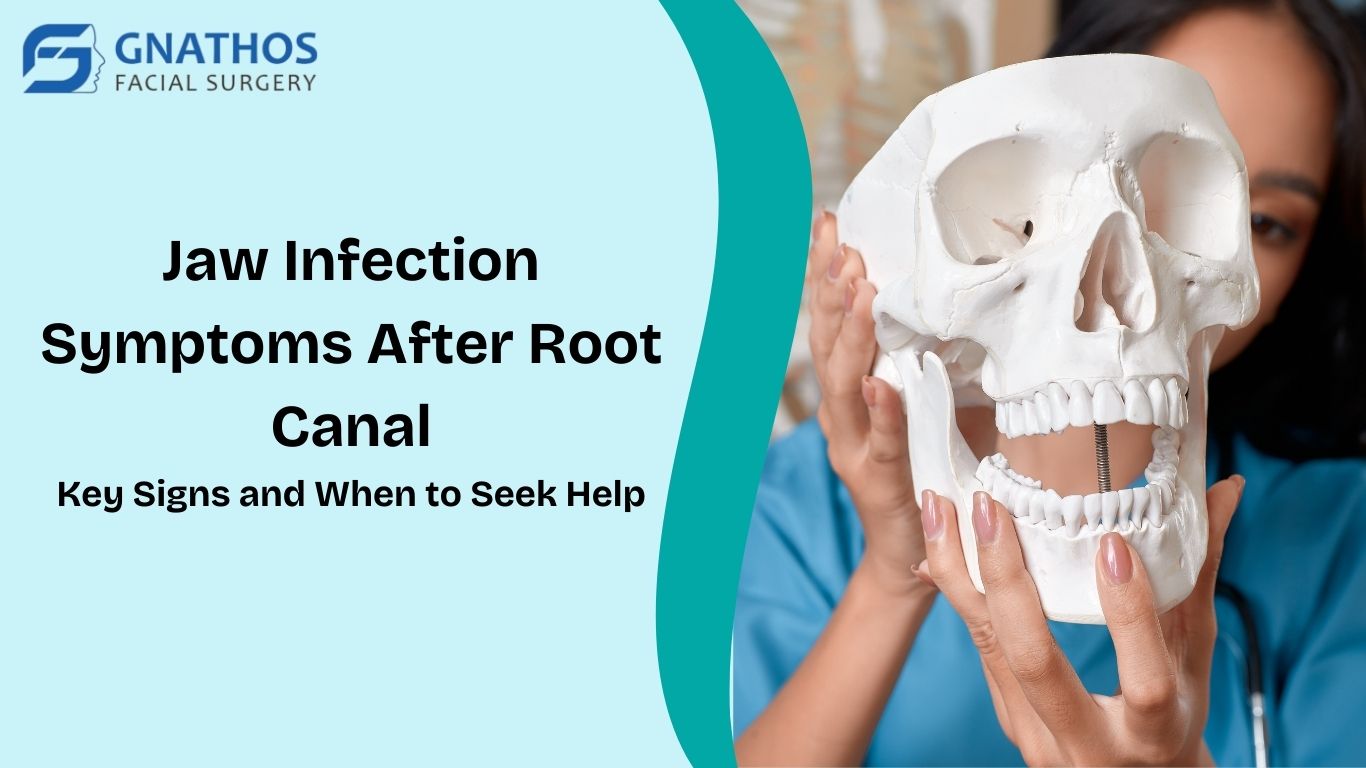Jaw Infection Symptoms After Root Canal : A root canal is a common dental procedure that aims to save a tooth that has become severely infected or damaged. During the procedure, the dentist removes the infected tissue from the inside of the tooth, cleans it, and seals it to prevent further damage. While a root canal is highly effective in resolving infection within the tooth, complications can arise afterward, including the possibility of a jaw infection.
If you’ve recently had a root canal and are experiencing unusual pain or swelling, you might be wondering if it’s normal or if it’s a sign of a more serious issue like a jaw infection. In this blog, we’ll walk you through the symptoms of jaw infection after the root canal, the causes, and what steps to take to ensure you get the right care and avoid further complications.
Looking for the best jaw surgeon in Hyderabad? Visit Gnathos Face for expert care and advanced treatment.
Understanding Jaw Infections After Root Canal

Before we dive into the symptoms, it’s important to understand how a jaw infection can develop after a root canal. Although rare, an infection can persist or develop after the procedure. This may occur due to a variety of reasons:
- Incomplete Cleaning of the Root Canal: Sometimes, bacteria can remain in the tooth even after the root canal is completed, especially if the cleaning wasn’t thorough or if there were complications in removing the infection.
- Tooth Fracture or Damage: If the tooth fractures after the root canal, it can expose the tooth to bacteria and cause an infection in the jaw.
- Reinfection: Occasionally, the tooth or the surrounding tissues may become reinfected after the procedure if bacteria manage to enter through the tooth’s filling or crown.
- Weak Immune System: Individuals with weakened immune systems may be more prone to infections, including those in the jaw after a root canal.
While these situations are not very common, it’s important to be aware of the symptoms and signs of a potential jaw infection after the procedure.
Symptoms of Jaw Infection After Root Canal
It’s essential to monitor your symptoms closely after a root canal to ensure that you’re not developing a jaw infection. Below are the key symptoms of jaw infection after root canal that you should be aware of.
1. Persistent Pain or Discomfort
While some discomfort after a root canal is normal as your tooth and surrounding tissues heal, persistent pain that doesn’t subside after a few days may indicate an infection. If the pain intensifies or lasts longer than expected, it could be a sign that bacteria are still present or have spread to the jaw.
What to look for:
- Continuous or throbbing pain that doesn’t improve with over-the-counter pain relief.
- Pain that worsens when you chew, bite, or touch the affected area.
- Pain that radiates to your jaw, face, or neck.
If you’re experiencing pain like this after a root canal, it’s important to get in touch with your dentist as soon as possible.
2. Swelling or Redness Around the Affected Area
Another common sign of a jaw infection after a root canal is swelling around the tooth or in the surrounding gum tissue. The swelling may be visible and can cause discomfort when you touch the area. This swelling can sometimes extend to the jaw, cheek, or even the neck.
What to look for:
- Swelling that is localized to the treated area or extends to nearby areas, such as the cheeks or jawline.
- Redness or inflammation in the gums around the treated tooth.
- Soft or tender swelling that feels warm to the touch.
Swelling is often accompanied by pain, so if you notice both together, it’s a clear indication that you should seek medical attention.
3. Fever
A fever is a general sign of infection in the body. If your root canal procedure is followed by a fever, it may be an indication that the infection has spread beyond the tooth and into the surrounding tissues, including the jaw. This is especially concerning if the fever is persistent and doesn’t subside with rest or pain relief.
What to look for:
- A low-grade fever (around 100°F to 101°F) in the first few days after the procedure could be normal, but a higher fever or a fever that lasts longer than a day or two is a red flag.
- Chills and sweating along with the fever can also be signs of an infection.
If you develop a fever after a root canal, it’s best to contact your dentist immediately for evaluation.
4. Pus or Drainage
If there is pus or any fluid draining from the treated area, this is a clear sign of infection. The presence of pus indicates that the body is fighting off bacteria, and the infection may be deepening or spreading into the jaw area.
What to look for:
- Pus or an unpleasant taste in the mouth coming from the treated tooth or gums.
- Drainage around the gums or inside the mouth near the tooth.
- An abscess or a small, pimple-like bump on the gum near the treated tooth that may leak fluid.
If you notice any pus or drainage, it’s crucial to see your dentist as soon as possible to prevent the infection from worsening.
5. Difficulty Moving the Jaw

A jaw infection after a root canal can cause swelling or inflammation in the jaw muscles, making it painful or difficult to open your mouth fully. This is a serious symptom that should not be ignored, as it could indicate that the infection is spreading to the jawbone or surrounding tissues.
What to look for:
- Difficulty opening your mouth wide.
- Pain when chewing or speaking.
- A clicking or popping sound when you move your jaw.
These symptoms may be a sign of TMJ (temporomandibular joint) issues caused by the infection, and you should seek medical help immediately.
6. Bad Breath or Foul Taste in the Mouth
Infections in the mouth often result in bad breath or a foul taste in the mouth, especially if pus is draining from the infected area. If you notice a persistent, unpleasant odor or taste in your mouth, it could indicate an underlying infection in the jaw.
What to look for:
- A persistent bad taste or odor that doesn’t go away after brushing your teeth or using mouthwash.
- Foul-smelling breath that is not alleviated by eating or drinking.
This is often associated with more advanced infections and requires prompt attention from your dentist.
7. Numbness or Tingling in the Jaw
If the infection spreads to the jawbone or the nerves surrounding the treated tooth, it can lead to numbness or tingling in the jaw. This symptom may suggest that the infection is affecting the nerves, and it should not be ignored.
What to look for:
- Numbness or a tingling sensation on the side of your face or jaw.
- Sensation loss that persists even after taking pain medication or resting.
This is a serious symptom that requires immediate attention, as nerve damage can result from untreated infections.
When to Seek Help
If you experience any of the symptoms listed above after a root canal, it’s important to seek help from your dentist or a healthcare professional immediately. Infections in the jaw can lead to more serious complications, including the spread of bacteria to other parts of the body, so it’s crucial to act quickly.
When to contact your dentist:
- If the pain is severe, constant, or worsening.
- If you develop swelling, fever, or pus near the treated tooth.
- If the infection is affecting your ability to eat, speak, or open your mouth.
- If you notice numbness or tingling in your face or jaw.
A timely visit to your dentist can help prevent the infection from spreading and ensure that you get the treatment you need to heal properly.
FAQs
What causes a jaw infection after a root canal?
A jaw infection after a root canal can occur if bacteria were left behind during the procedure, if the tooth was not properly sealed, or if the tooth fractures after treatment. Other factors like a weak immune system can also increase the risk of infection.
How can I tell if my jaw pain is from an infection?
Symptoms of a jaw infection may include persistent pain, swelling, fever, pus or drainage, difficulty moving the jaw, and bad breath. If you experience any of these symptoms, it’s important to seek dental care immediately.
Can a root canal fail and cause a jaw infection?
Yes, although rare, root canal procedures can fail if the infection isn’t fully removed, or if the tooth is not properly sealed. This can lead to reinfection, which could spread to the jaw and surrounding areas.
How is a jaw infection treated after a root canal?
Treatment for a jaw infection may include antibiotics to clear the infection, drainage of any abscess, and in some cases, a second root canal or surgical intervention to treat the infected area.
Can a jaw infection be serious after a root canal?
Yes, a jaw infection can be serious if left untreated. It can spread to surrounding tissues, bones, and even into the bloodstream. It’s crucial to seek professional treatment if you notice signs of infection after a root canal.
Conclusion
Jaw infections after a root canal, while not common, can occur if there are complications during or after the procedure. By understanding the symptoms of jaw infection after root canal, you can take the necessary steps to address the issue early on and avoid further complications.












